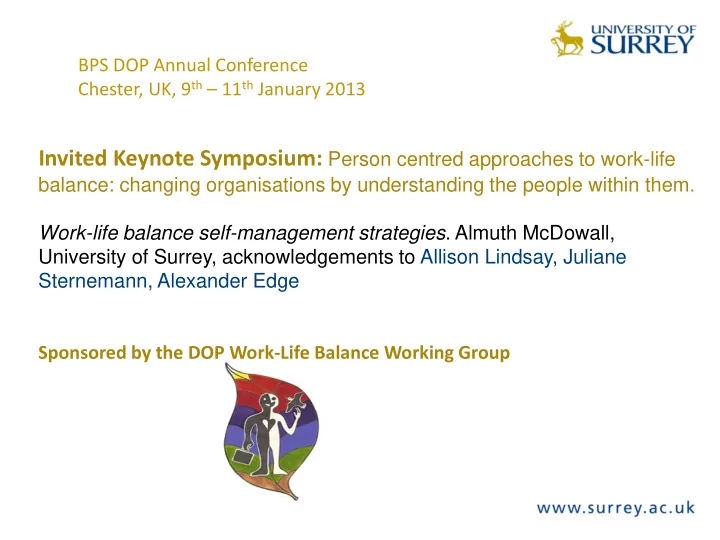

BPS DOP Annual Conference Chester, UK, 9 th – 11 th January 2013 Invited Keynote Symposium: Person centred approaches to work-life balance: changing organisations by understanding the people within them. Work-life balance self-management strategies . Almuth McDowall, University of Surrey, acknowledgements to Allison Lindsay, Juliane Sternemann, Alexander Edge Sponsored by the DOP Work-Life Balance Working Group
UK Police as a critical sample Spending review → Operational and Organizational changes, regional variation High risk job, work-family conflict potential cause for burnout – focus on people, not ‘just workers’ Need to develop research with practical implications , “things are dire” mindset not helpful for individuals! WLB about perceptions, fluid, malleable
Theoretical gap • Domination of conflict paradigm: – Documented negative outcomes, work and non-work related – Individual differences as antecedents: • Stable personality: High neuroticism = high conflict • Malleable differences: self efficacy, positive affect, proactive personality: high levels linked to low conflict • Coping skills: e.g. behavioral problem focused skills more effective in ameliorating FWC than WFC (Rotondo et al., 2003) – How can these be fostered?
WLB as skills/ competence approach? • Frone (2003): facilitation = transfer of skills between life domains • Kossek et al (2010): acquisition and development of skills as enhancer of well being, and potential trigger for organisational change • Border theory (Clark, 2000); Kossek et al.’s (2012) person centred approaches: border/ boundary management and negotiation – what facilitates individual effectiveness?
Behavioural approach: competencies • KSAs (Boyatzis, 1982) • Successfully applied to understanding stress management competence (Lewis et al, 2010:, Yarker et al., 2007; 2008; Donaldson-Feilder et al., 2009) • Specific competencies for WLB management in the context of UK police force: – What are they? – Do they differ between groups in the organization? – Relationship to overall ‘WLB self -management competence measure’
Method Large modernising UK force Survey analysis Card sort for initial to cluster validation and refine Behaviour elicitation through interviews
Interviews • Purposive sample 20 full-time Police Force members; officers (n = 9) and civilian police staff (n = 11) from different areas of operations (neighbourhood patrols, specialist roles, criminal investigations), with specific focus on frontline roles; 14 male and 6 female • Semi-structured interviews: including CIT, critical examples for WLB management; transcription • Average number of two incidents per interview, 302 behaviours; reviewed and refined to 134 behaviors
Card sort: Two groups + expert review: 12 behavioral themes
Survey • Online survey testing the 12 behavioral themes, piloted first, each behaviour rated on 5-point effectiveness scale • 356 respondents, 212 completed each and every question • Reliability analysis; excluded items with extreme facility index; regressions for 11 clusters (12 th cluster distinct, as encompassed ‘managing WLB in others’) • 58 behavioural items retained, such as “ Finishing daily work tasks to avoid taking things home”, “Ring -fencing me- time”, “Anticipating problems”
PCA and Bivariate analysis • PCA: 10 -component solution, few cross loadings, separate component 11 (manager competence) • Few inter- correlations, except ‘Making lifestyle changes’ and ‘Communication’, with correlated with nearly all other competencies • Overall compound competency: closest association with ‘communication’ • Work Ethic and Self Reliance: negative competencies, “workaholics”?
Findings in summary • Competencies ranged from broad to narrow • Seeking support become “Self reliance” – Cultural factors? • Context specific: for instance NOT taking work home effective boundary management in this population – potentially confidential and also intrusive work • Communication and negotiation important • Separate competence for line managing WLB in others
Implications • Theoretical: WLB understood as KSAs, gap in the literature so far. Competencies models widely used in practice, not reflected in research to date • Practical: screening, training, raising self awareness. Empowering, not limiting • Future research: further validation, different occupations, is there a ‘global WLB KSA model’?
Thanks. And please stay in touch! Almuth McDowall, a.mcdowall@surrey.ac.uk
Recommend
More recommend